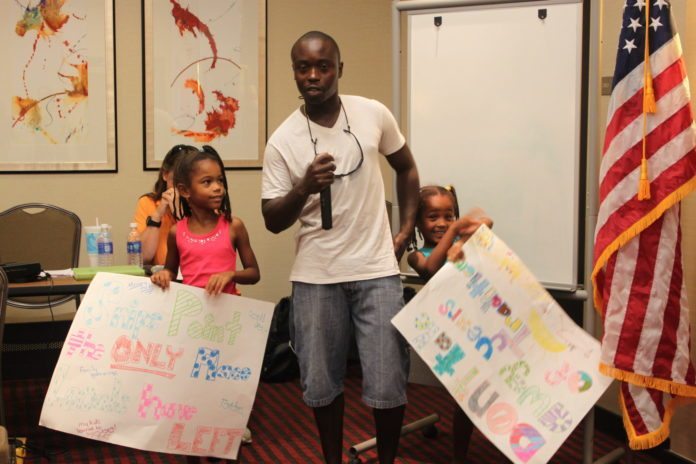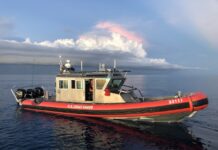Jimmy Greene brought his daughters Jaylin and Jordan to the meeting. ‘We don’t have arcades in the Keys. Going to the sandbar is our tradition. We want to be able to enjoy our own backyard,’ Jimmy said.
‘Nuisance and law enforcement’ issues should be handled by MCSO, FWC
After an anonymous person posted signs at various Keys sandbars — or popular party spots — warning of their closure, a crowd came out to defend the tradition at the Tuesday meeting of the Florida Keys National Marine Sanctuary Advisory Council. Although the crowd of about 30, mostly from the Lower Keys and Key West, came ready to defend their beloved pastime, it was ultimately unnecessary.
Sanctuary Advisory Council member Peter Freeza of Tavernier said the Shallow Water Wildlife and Habitat Protection Working Group spent days going over the sandbar recommendations as part of a scheduled review, 25 years after its creation.
However, the SAC brought forward an abbreviated resolution that states problems associated with “concentrated uses” or “marine events,” be referred to the Fish and Wildlife Commission and Monroe County Sheriff’s Office as nuisance or law enforcement issues best handled by law officers.
It was a relief to opponents of sandbar closures and a bitter disappointment to homeowners who seek relief from the marine parties on their doorsteps. SAC member Martin Moe of Lower Matecumbe is also an affected homeowner. He described a raucous scene of inebriation, loud music, littering and turtle grass destruction. Moe said that when he calls the Sheriff’s Office, as the resolution suggests, the deputy stands on shore and says there is nothing he can do about the party on the water a few hundred yards away.
“It’s a social gathering of 25 to 200 boats. They do ecological damage to the seagrass in those areas. If we seek to protect our seagrass from the small impacts, we should protect them from the large impacts. I think the sanctuary should have a voice in this matter,” he said.
Apart from three speakers, the rest of the audience was adamant on sandbar rights survival and spoke vehemently on an obvious point.
“We’re on the sandbar. We’re anchoring in the sand. There’s no seagrass where the boats are,” said Ricky Arnold of Key West, a frequent visitor to Marvin Key. “We’re governed by everybody and their mother already. Lets leave the laws that we already have in place. FWC does a great job.”
Lower Matecumbe and Duck Key are the most problematic sandbar party sites because they are located adjacent to neighborhoods. Marvin Key, Snipes Key, Valhalla and Holiday Isle front undeveloped keys or are farther offshore. Both members of the audience and SAC members acknowledged that the sandbar parties grow larger every year.
Resident Rick Gage mentioned the coming implementation of the Biscayne National Park’s general management plan and its affect on neighboring Keys waters. The plan calls for tighter restrictions such as an end to lobster sport season and fewer places to anchor.
“Where are those boats going to go? They are going to come here. It’s an education issue. I want to enjoy my island, we should all be able to enjoy it,” Gage said. “But this is an enforcement issue. We need more enforcement out there.”
Currently, the Monroe County Sheriff’s Office, The Florida Keys Marine Sanctuary and the state Fish and Wildlife Commission provide all the law enforcement in the Keys’ nearshore waters. Unfortunately, their numbers are low: three sheriff’s deputies, two sanctuary officers and 55 FWC officers. (The U.S. Coast Guard typically focuses on long-distance interdiction and search and rescue missions.)
Bill Kelly, executive director of the Florida Keys Commercial Fishermen’s Association, agreed it’s a matter for the law.
“Sandbars like the one at Holiday Isle are already established. The damage is done. We do further damage by scattering the boats to other places,” Kelly said. “What are we going to do? Deny access for boaters to enjoy the water? There are rules and regulations in place for safe boating. This is an issue for law enforcement.”



























